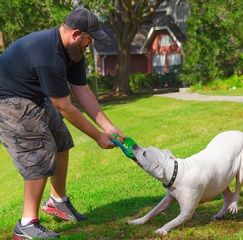Dogs Helped Veterans with PTSD
Veterans with PTSD did better when they adopted dogs, a Texas study found.

It may not come as a surprise to dog-lovers, but research presented at the American Psychiatric Association meeting in Atlanta, GA showed that adopting a canine companion proved helpful to veterans with post-traumatic stress disorder (PTSD).
Researchers at the University of Texas Health Science Center at San Antonio, TX reported on veterans who were suffering from depression and loneliness, as well as PTSD.
In the study, lead researcher Stephen Stern, MD, an adjunct proessor in the UT's department of psychiatry and research investigator at the South Texas Veterans Health Care System in San Antonio, looked at what happened when nine such veterans being treated for PTSD got a dog. A control group with similar symptoms did not get a dog.
The veterans were allowed to choose a shelter dog from a local Humane Society facility, and none of the animals were trained service dogs.
Most veterans in the dog group reported developing close bounds with their pets and becoming more physically and socially active.
"They also described improvements in their overall happiness, ability to cope with stress and relationship with others," the team reported.
The study lasted three months.